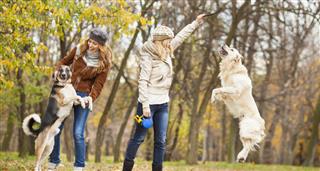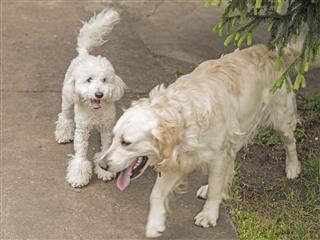
If your dog jumps at the mere ring of a door bell or the buzz of an alarm clock, then chances are you are dealing with nervous behavior. This article lists some methods to correct the same.
Some people are simply terrified of dogs. Ironically, some dogs are also equally terrified of people. Usually, dogs are synonymous with playful, boisterous animals that often become your best mates. You obviously don’t want a whimpering little creature who hides under a table whenever the doorbell rings, or barks at every passerby. Nervous behavior is a common problem in dogs, and it can be corrected with a little training.
Detection of Nervous Behavior
Just like human beings, dogs also have their own unique personalities. Some dogs are naturally peaceful and quiet, while others are dominant and aggressive. There are also some dogs that have a nervous personality. Such dogs may or may not exhibit aggressiveness. However, they are very likely to display some strange behavior which is unique to this personality. Nervous dogs are often jumpy and restless. They become hyper at the slightest hint of sound and start barking.
Such dogs bark unnecessarily, jump around, chase other dogs as well as people, and whimper without a reason. They may also overreact to normal sounds such as doorbells or telephone rings. Besides, they may suddenly become very fearful when you have visitors, and hide under a table or run away to another room. This type of behavior may be targeted at particular visitors or at anyone who visits your house.
How to Correct It
There are several ways of correcting dog behavior that is nervous or fearful. However, you are more likely to succeed if you are aware of the causes that trigger it in your dog. Alleviating that cause is the best way of controlling this behavior.
Keep Yourself Calm
Dogs have a tendency to inherit the traits of their owners. They are very likely to reflect your behavior back to you. If you exhibit an overexcited behavior in front of your dog, he/she is very likely to pick up on your body language and mimic it.
Let Your Dog Socialize
Dogs also tend to imitate the behavior of other dogs. Hence, allow your dog to mingle with other dogs in the neighborhood. A friendly, bold dog can be a good influence. After spending a few days with such an animal, your own dog will most likely overcome his/her fear and nervous behavior.
Exert Your Dog
Most behavior problems in dogs originate due to lack of exercise. If your dog has a lot of unused energy, he/she may direct it to destructive activities. If you exert your dog sufficiently, he/she won’t have any energy left for throwing tantrums or indulging in such other activities. Exercises also help to stimulate the release of endorphins, which are the chemicals responsible for keeping your dog calm and happy.
Give Your Dog a Massage
A good massage goes a long way in controlling the nerves of your dog. Spend at least 30 minutes massaging him/her in a quiet corner of your house. You may use aromatherapy oils for a soothing effect. Massage will have a calming and relaxing effect on your dog.
Music
Dogs respond to music just like humans. Calming, soothing music has the ability to relax even the most hyper of all dogs. Whenever your dog begins to turn restless or shows any signs of nervous behavior, always make it a point to put on some good music. However, avoid putting on loud, shrill music with lots of instruments in the background. This is likely to scare him/her even more.
Training can be conducted by a professional trainer who is well-acquainted with the particular problems of such dogs. You may even educate your family members to handle the specific needs of your dog. Nervous behavior may take a few months to cure completely. You may also inform your visitors about your dog’s nervousness, so that they do not do anything to alarm him/her.






